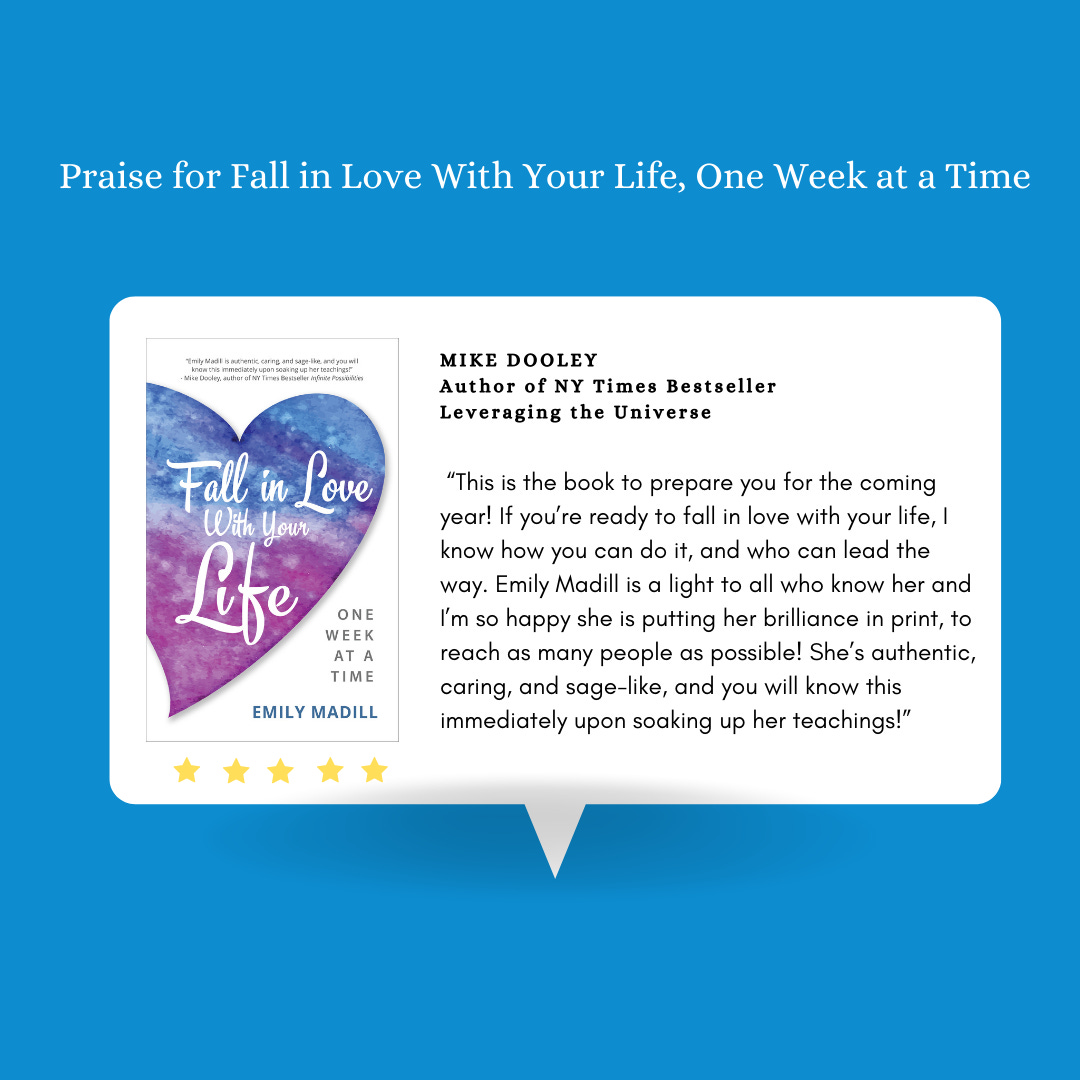Weekly Happiness Note November 21, 2024
5 Evidence-Backed Strategies to Boost Motivation When You Have None
“When you believe in possibilities, it becomes easier to take meaningful and hopeful action toward your goals.”
Motivation can wax and wane through our different seasons of life. If you are feeling in a bit of a slump or unmotivated, check out this week’s Happiness Note, “5 Evidence-Backed Strategies to Boost Motivation When You Have None,”
You can access this week's topic below (available for free subscribers) and consider becoming a paid subscriber to receive the weekly planning prompt and framework to set you up for November 25th- December 1st. ❤ Emily
This Week’s Featured Topic:
5 Evidence-Backed Strategies to Boost Motivation When You Have None
It’s not easy to put your best foot forward when it’s stuck in a rut.
We all lose our way. I can get lost. The truth is, sometimes life is hard. Even the most well-equipped optimists get swallowed up in the rigors of life.
But we can learn from those optimists. They are well-practiced at relying on trusted strategies to move through challenges and get unstuck a little quicker. Some call them resilient. But resilience isn’t a matter of luck or good fortune. Resilience means moving — sometimes crawling — through the wreckage to rise after life’s storms.
Whether or not you feel resilient or optimistic, it is possible to lift your spirits and experience a boost of motivation when you have none.
Here are five expert-approved strategies I use to spur myself on when my motivation has tanked. Give them a try and see what shifts.
1. Slow Down to Speed Up
Falling flat on your face can be a sign that it’s okay — ahem — imperative to slow down. Instead of worrying about feeling stuck, rest and recharge.
When I find myself procrastinating on tasks and to-dos, or I don’t have enough pep in my step to joyfully move through the day, I start with a good night’s sleep. Good sleep hygiene impacts how we feel physically, mentally and emotionally.
If your sleep feels on point but you are pushing yourself to the brink of burnout throughout the day, see how it feels to give yourself regular brain breaks and downtime. In his article “Why Your Brain Needs More Downtime,” Ferris Jabr explains, “Downtime replenishes the brain’s stores of attention and motivation, encourages productivity and creativity, and is essential to both achieve our highest levels of performance and simply form stable memories in everyday life.”
Granting yourself permission to regularly recharge is a good thing. It will help restore your sense of gumption and excitement. At the very least, rest will give you more energy.
2. Tap Into Your Imagination
Mindset and imagination fuel both intrinsic and extrinsic motivation. Intrinsic motivation is the motivation to do something because it’s personally rewarding. Extrinsic motivation happens when outside forces compel you to move forward in order to earn a reward or avoid a punishment.
When you are feeling drained or unmotivated, spend a bit of time visualizing the intrinsic and extrinsic results of reaching your goal: the way it will make you feel or the reward you will receive (or give yourself!).
A. J. Adams’s article “Seeing Is Believing: The Power of Visualization” states, “It’s been found that mental practices can enhance motivation, increase confidence and self-efficacy, improve motor performance, prime your brain for success, and increase states of flow — all relevant to achieving your best life!”
Visualization helps you believe that it’s possible to achieve what feels challenging or unreachable. The more you believe in possibilities, the easier it will be to follow through on the necessary steps to reach your goals and take hopeful action.
3. Reverse Engineer
Once you have the big picture worked out, you’re on your way. You know how you want to feel. You believe that it’s possible to get there. The next important step is to reverse engineer that big picture into small steps.
In her article “Meet Your Goals with Research-Proved Tips and Techniques,” Marina Krakovsky argues that “by going after your target one small step at a time, you will reduce the effort it takes to ingrain new habits and improve your self-confidence naturally.”
Taking small steps will help you sustain your motivation to keep going. Instead of becoming overwhelmed, throwing in the towel and feeling stuck all over again, choose to move forward with realistic tasks and attainable goals.
4. Feel What’s Real
When it’s extra hard to get up and get after it, it’s worth exploring the emotions beneath the malaise. Many of us tend to push through the hard bits in life without actually processing them. But the heavy bag of unresolved emotions can be a burden that drags us down and holds us back. Stuffing down emotions in an effort to forge ahead doesn’t get rid of them. They will just bubble up later — usually when it’s most inconvenient.
Those tough emotions also say a lot about us, and that knowledge can give us a greater sense of control over our goals and path forward. As Beth Kurland observes in “What Happens When We Embrace Dark Emotions,” “It can be useful to name our feelings (Oh, that’s hurt; that’s jealousy; that’s anger) because, as simple as this sounds, we often don’t pay attention to the nuances of what we are feeling; consequently, important information gets lost along the way. Labeling our distressing emotions gives us a way of validating our inner experience, but it has the added benefit of dialing down their intensity.”
In order to truly move the energy, allow yourself to feel what’s real, especially the hard stuff.
5. Divert Your Attention
Instead of beating up on yourself for slowing down or procrastinating, view your attention as your superpower. Be intentional about where you put your focus. Reset by putting your attention on something that feels good right now.
Go for a walk, call an uplifting friend, listen to music, have a bath or shower, get out in nature, or do whatever it is you enjoy doing. Do it with intention. And then come back to your task with fresh eyes. What feels different?
A study by the University of Illinois Urbana-Champaign, for instance, found that “deactivating and reactivating your goals allows you to stay focused.” It suggests that, instead of punishing yourself for slacking off, “when faced with long tasks (such as studying before a final exam or doing your taxes), it is best to impose brief breaks on yourself. Brief mental breaks will actually help you stay focused on your task!”
While every challenge and stuck place can teach us something important, sometimes it’s beneficial to get moving and make the most of our moments. Being armed with these simple strategies may not move mountains in a day, but they can help boost your motivation. You’ve got this!
This Week’s Quote:
Limited on time or don’t feel like reading
Check out this week’s Video instead:
Subscribe above to unlock your weekly planning prompt, including a printable planning framework for November 25th- December 1st.
Planning for Next Week📝:
Use the framework below to plan your upcoming week: November 25th- December 1st. Some people like to map out their forthcoming week on Friday to ease into the weekend, knowing they are ready to hit the road running on Monday. Others (like myself) have a Sunday planning ritual. Do what works best for you. Over the years, in supporting many people in their planning and goal-setting, it seems to work best to pick a day of the week that’s easy to stick to so that your weekly planning becomes a habit and ritual.
What are your wins? Before you organize the upcoming week, ‘November 25th- December 1st’, reflect on the week you are wrapping up. What are your wins (big or small)? What is something you are grateful for? What have you learned about yourself this week? Record your reflections in your journal or the Notes section of the Planner Printout. Feel free to comment below (others in this community will also be able to see your comment) or hit reply to this note and share directly with me.
Planner PDF printout: This printout is from the ‘Fall in Love with Your Life, Seasonal Planner’ and will give you the framework and planning system to help you organize your upcoming week: November 25th- December 1st. Click here to access. You will need to enter a password to open the PDF. It’s in all caps: FILWYL
Accountability: If you’d like an accountability check-in to support you in making the weekly planning ritual a regular habit, just hit reply to this email after you’ve organized your week and let me know you’re organized and complete. Feel free to share your weekly intention/power word. I’m always happy to be the check-in support and would love to celebrate your wins.
Instructional Video: Get free access to this mini 20-minute video course. It will show you how to efficiently use the ‘Fall in Love With Your Life, Seasonal Planner’ method of organizing your week. Go here to access the free video course.
Priorities: What are your top three priorities for the upcoming week? What are some of the daily ways you will prioritize yourself? Remember to balance your energy output with energy input. Think: What has been energizing me lately? What has been draining my energy?
Connect with Nature: When nature presents us with storms, it can serve as a reminder of its power and how quickly our lives can be impacted. Life’s storms can teach us that while there is so much about life that is outside of our control, we can lead an empowered life by reflecting on the ways we choose to dance with life.
Journal reflection point prompted by nature: All things in life are temporary, including storms. What might shift if you leaned into the idea that everything comes to pass, including life’s storms and highlights? How can you incorporate this learning into how you receive and react to life?
Share your intention for the week of November 25th- December 1st. What are you calling in? What is your power word/phrase?
Or come Share in our Facebook Group
Disclaimer: This newsletter's advice and strategies are for informational purposes only and do not constitute professional advice. While we strive to provide accurate and helpful information, we cannot guarantee outcomes or be held liable for any consequences of using or misusing the information provided. We encourage you to seek professional advice or consult with qualified experts for guidance related to your particular needs.






